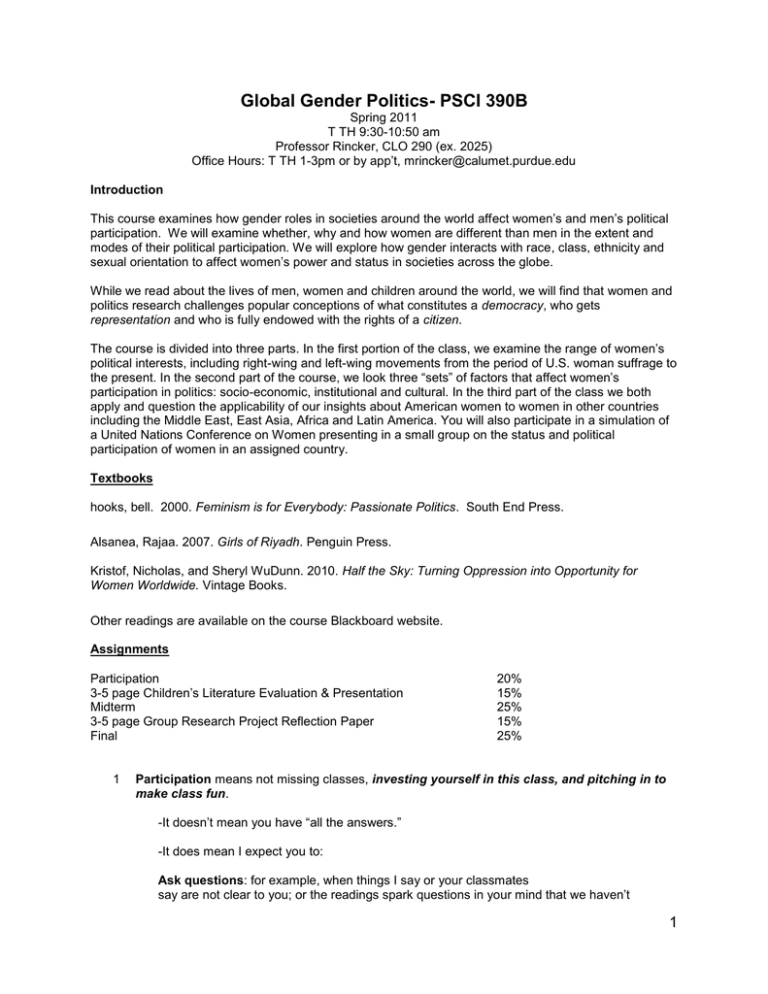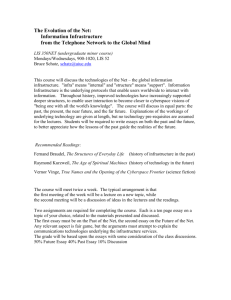Global Gender Politics
advertisement

Global Gender Politics- PSCI 390B Spring 2011 T TH 9:30-10:50 am Professor Rincker, CLO 290 (ex. 2025) Office Hours: T TH 1-3pm or by app’t, mrincker@calumet.purdue.edu Introduction This course examines how gender roles in societies around the world affect women’s and men’s political participation. We will examine whether, why and how women are different than men in the extent and modes of their political participation. We will explore how gender interacts with race, class, ethnicity and sexual orientation to affect women’s power and status in societies across the globe. While we read about the lives of men, women and children around the world, we will find that women and politics research challenges popular conceptions of what constitutes a democracy, who gets representation and who is fully endowed with the rights of a citizen. The course is divided into three parts. In the first portion of the class, we examine the range of women’s political interests, including right-wing and left-wing movements from the period of U.S. woman suffrage to the present. In the second part of the course, we look three “sets” of factors that affect women’s participation in politics: socio-economic, institutional and cultural. In the third part of the class we both apply and question the applicability of our insights about American women to women in other countries including the Middle East, East Asia, Africa and Latin America. You will also participate in a simulation of a United Nations Conference on Women presenting in a small group on the status and political participation of women in an assigned country. Textbooks hooks, bell. 2000. Feminism is for Everybody: Passionate Politics. South End Press. Alsanea, Rajaa. 2007. Girls of Riyadh. Penguin Press. Kristof, Nicholas, and Sheryl WuDunn. 2010. Half the Sky: Turning Oppression into Opportunity for Women Worldwide. Vintage Books. Other readings are available on the course Blackboard website. Assignments Participation 3-5 page Children’s Literature Evaluation & Presentation Midterm 3-5 page Group Research Project Reflection Paper Final 1 20% 15% 25% 15% 25% Participation means not missing classes, investing yourself in this class, and pitching in to make class fun. -It doesn’t mean you have “all the answers.” -It does mean I expect you to: Ask questions: for example, when things I say or your classmates say are not clear to you; or the readings spark questions in your mind that we haven’t 1 discussed, etc. Share your thoughts and opinions on what we read (or don’t read, and why), what we see, what you observe in the world, what other people say in class or on our class website. Take ownership of your education and the incredible opportunity we have to learn and grow in this class. Try to make each class relate to you and your life and contribute in some way to every class period. 2 Children’s Literature Evaluation and Presentation. What are gender roles? How are gender, race, class and sexuality roles portrayed in the books we read as children? For this assignment choose a favorite book you read as a child and use our discussion of sex, gender, sexual orientation, transgender, and intersectionality to evaluate this book. In 3-5 pages, you need to evaluate how the book presents gender roles, whether or not you agree with that depiction and why, ultimately stating whether you would read it to kids you know, and how you would discuss it with them. The last sentence of the first paragraph of your paper MUST be highlighted and MUST state your thesis on how this book presents gender roles to children and whether or not you agree with the book’s presentation of gender roles, or how you would discuss the roles with children. In the pages that follow the thesis statement, you must support your thesis using quotations from the book, the sources we have read/discussed, and if applicable, your discussion can allude to illustrations from the book. You will post an illustration or quote from your book on the class website. More details on the presentation will be provided later. 3 4 TRIANGLE OF EMPOWERMENT PRESENTATION/ SIMULATION-Students will sign up to present in groups of three on the current status of women’s “triangle of empowerment” in one of 10 countries. (Instructor will pass around a list of 10 possible countries early in the semester). Each student will present on one of the following: women in legislature, women in state bureaucracy, or women in civil society. We will simulate the Fourth U.N. Conference on Women in Beijing, 1995. Note: Part of your grade for the presentation will be on the basis of evaluations provided by your group members. Midterms and Exams: These are a mixture of Identifications and Essays. For the essay portion, I will hand out the essay question in advance and you will bring your completed essay to the start of the class period: typed to my specifications. For the identifications, I give you a list of possible terms when I hand out the essay questions, and I will choose some from that list on the exam day that you will be asked to define and provide an explanation of why the term is important to the course. Grading Scale 97-100 A+ 93-96 A 90-92 A87-89 B+ 83-86 B 80-82 B- 77-79 C+ 73-76 C 70-72 C67-69 D+ 63-66 D 60-62 D59 and below F COURSE SCHEDULE 2 Date Topic Reading Assignment Jan. 18 Introductions and Class Overview 1. Watch the online Movie: “Woman’s Kingdom” http://www.pbs.org/frontlineworld/rough/ 2005/07/introduction_to.html 2. use the Blackboard website Message Board for our class to post what you think about the Mosuo community from the Woman’s Kingdom film. Jan.25 Sex, Gender and Transgender Nature vs. Nurture 1. “Why Girls will be Girls”-BB 2. “Rethinking Gender”- BB 3. “Don’t Worry Your Pretty Little Head” http://slate.com/id/2112570/ Jan. 27 First Wave Women’s Movements One Woman, One Vote video in class 1.Sojourner Truth “Ain’t I a Woman?” Feb. 1 Second Wave Feminism Feb. 3 Third Wave Feminism Feb. 8 Intersectionality 1.Carol Hardy-Fanta 2.Ange-Marie Hancock Video: Hip –Hop Beyond Beats &Rhymes Feb. 10 Intersectionality, continued Bring printout of your favorite hip-hop lyrics to class Feb. 15 Masculinity and Men’s Movements 1.Selections from Iron John by Robert Bly Feb. 17 Prostitution, Violence against Women, Women’s Health Kristoff and Wu Dunn p. 3-148 Feb. 22 Gendered Effects of the Economy 1. Liz Featherstone 2. Nancy Folbre Children’s Literature Evaluation due Today, Start of Class Feb. 24 Gender Gap, Political Recruitment Campaigns 1.Kay Schlozman 2.Matthew Streb, Barbara Burrell et al. 3.Fox and Lawless 4.Fridkhin-Kahn Mar. 1 Women’s Participation Worldwide 1.Pippa Norris and Ron Inglehart 1.Playboy Bunny essay by Gloria Steinem 2.The Feminine Mystique by Betty Friedan 3.Feminist Fantasies by Phyllis Schlafly Students turn in one paragraph about book you plan to analyze for your children’s literature essay 1.hooks, bell Feminism is for Everybody p. vii-118 2.“I am the Third Wave” Rebecca Walker 3 chapter Mar. 3 Women’s Status in Political Institutions: Critical Mass/Critical Actors Mar. 8 Effects on Society Mar. 10 Midterm Exam Mar. 15/17 SPRING BREAK NO CLASS 1.Rosabeth Moss Kanter 2.Lyn Kathlene; Meg Rincker Mar. 22 Women’s Rights in Developing World UN Conferences on Women: Nairobi; Mexico City: Beijing and Beyond Mar. 24 Diffusion of Gender Quotas Worldwide:debate Bicycle Citizens 1. Selections from Georgina Waylen 1. Mona Lena Krook Mar. 29 Triangle of Empowerment/ What Women Want 1.Nijeholt i Lycklama 2. Meg Rincker Mar. 31 Professor Presenting at Midwest Political Science Association Conference; Meet with your group during class time Apr. 5 Cut from a Different Cloth Apr. 7 Professor Presenting Out of Town on This Date Kristof and WuDunn pp.167-262. Apr. 12 Girls of Riyadh Part I Apr. 14 Girls of Riyadh Part II Apr. 19 Women in Middle East Pew Survey Report Apr. 21 East meets West 1.” Gender Trouble at Abu Ghraib” Timothy Osborne-Kaufman Apr. 26 Simulation Groups TBA Apr. 28 Simulation Groups TBA May 3 Simulation/Review/Evaluations Groups TBA May 5 Final Exam During Classtime Kristof and WuDunn pp.149-166. 4





